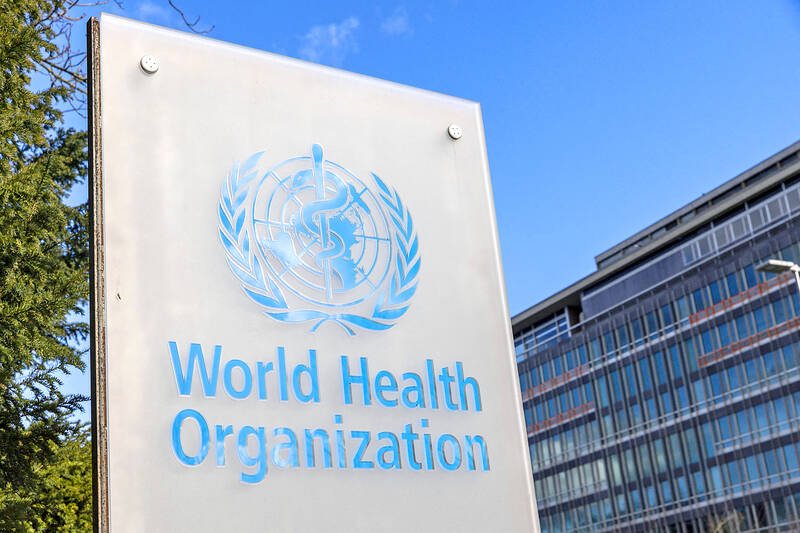The UN has contradicted its charter and infringed on freedom of the press by asking two Taiwanese correspondents covering the World Health Assembly (WHA) in Geneva, Switzerland, to present a Chinese passport when applying for interview permits, the Association of Taiwan Journalists said yesterday.
With the 77th WHA beginning on Saturday, the Central News Agency’s Brussels correspondent Tien Si-ru (田習如) and Paris correspondent Judy Tseng (曾婷瑄) followed the same procedures as they did last year to apply for interview permits at the UN office in Geneva, the association said.
As the online application form does not list Taiwan or the Republic of China under the options for nationality, Tien and Tseng chose Thailand and Tuvalu respectively, and wrote in the comment section that they are from Taiwan (Republic of China), the association said.

Photo: Reuters
Last year, the two journalists’ interview permit applications were approved ahead of the WHA, but UN staff refused to issue them when Tien and Tseng went to collect them at the UN office in Geneva, saying that they were under pressure from China, the association said, citing Tien.
This year, the two received replies from the media credential review committee on May 9 and May 10, asking them to provide “an official Chinese passport that complies with UN policies and guidance for the UN General Assembly resolutions,” it said.
Tien said that she responded by sending a copy of her Taiwanese passport and other supporting documents, and has not heard from the committee since, it said.
“The UN knows very well the relations between Taiwan and China, but it still insisted that the two journalists present Chinese passports that they could not possibly have. This is the same as rejecting requests from Taiwanese news media to cover the WHA meeting,” the association said.
This unreasonable request contradicts the purpose of the UN stated in Article 1 of the UN Charter, which states that it was established to promote and encourage “respect for human rights and for fundamental freedoms for all without distinction as to race, sex, language or religion,” the association said, adding that the UN was infringing on freedom of the press, freedom of speech and other universal values.
“We call on the UN to stop being interfered with by China and issue formal interview permits to journalists affiliated with Taiwanese media to facilitate reporting on important international conferences such as the World Health Assembly, achieve the purpose of news dissemination, ensure the full flow of information and satisfy the public’s right to know,” the association said.
The International Federation of Journalists also issued a statement in support of the association.
“Events like the World Health Assembly hold significant importance to people in all countries, and it is the responsibility of the UN and other presiding authorities to ensure that the media can conduct its duties without interference from special interests,” the federation said. “The UN and its affiliate organizations must fulfill its commitments to press freedom.”

ACTION PLAN: Taiwan would expand procurement from the US and encourage more companies to invest in the US to deepen bilateral cooperation, Lai said The government would not impose reciprocal tariffs in retaliation against US levies, President William Lai (賴清德) said yesterday, as he announced five strategies to address the issue, including pledging to increase Taiwanese companies’ investments in the US. Lai has in the past few days met with administrative and national security officials, as well as representatives from various industries, to explore countermeasures after US President Donald Trump on Wednesday last week announced a 32 percent duty on Taiwanese imports. In a video released yesterday evening, Lai said that Taiwan would not retaliate against the US with higher tariffs and Taiwanese companies’ commitments to

Intelligence agents have recorded 510,000 instances of “controversial information” being spread online by the Chinese Communist Party (CCP) so far this year, the National Security Bureau (NSB) said in a report yesterday, as it warned of artificial intelligence (AI) being employed to generate destabilizing misinformation. The bureau submitted a written report to the Legislative Yuan in preparation for National Security Bureau Director-General Tsai Ming-yen’s (蔡明彥) appearance before the Foreign Affairs and National Defense Committee today. The CCP has been using cognitive warfare to divide Taiwanese society by commenting on controversial issues such as Taiwan Semiconductor Manufacturing Co’s (TSMC, 台積電) investments in the

HELPING HAND: The steering committee of the National Stabilization Fund is expected to hold a meeting to discuss how and when to utilize the fund to help buffer the sell-off The TAIEX plunged 2,065.87 points, or 9.7 percent, to close at 19,232.35 yesterday, the highest single-day percentage loss on record, as investors braced for US President Donald Trump’s tariffs after an extended holiday weekend. Amid the pessimistic atmosphere, 945 listed companies led by large-cap stocks — including Taiwan Semiconductor Manufacturing Co (TSMC, 台積電), Hon Hai Precision Industry Co (鴻海精密) and Largan Precision Co (大立光) — fell by the daily maximum of 10 percent at the close, Taiwan Stock Exchange data showed. The number of listed companies ending limit-down set a new record, the exchange said. The TAIEX plunged by daily maxiumu in just

‘COMPREHENSIVE PLAN’: Lin Chia-lung said that the government was ready to talk about a variety of issues, including investment in and purchases from the US The National Stabilization Fund (NSF) yesterday announced that it would step in to staunch stock market losses for the ninth time in the nation’s history. An NSF board meeting, originally scheduled for Monday next week, was moved to yesterday after stocks plummeted in the wake of US President Donald Trump’s announcement of 32 percent tariffs on Taiwan on Wednesday last week. Board members voted to support the stock market with the NT$500 billion (US$15.15 billion) fund, with injections of funds to begin as soon as today. The NSF in 2000 injected NT$120 billion to stabilize stocks, the most ever. The lowest amount it